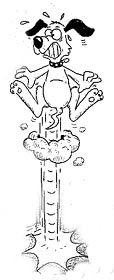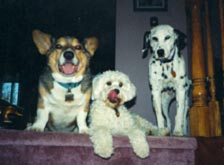Drugs
These
may be useful in some cases
but should only be given under
veterinary supervision. Remember
they should be given so they
take effect BEFORE any noise
starts or panic sets in. This
is usually at least an hour
prior to the event. Sedatives
may help the pet sleep through
the event or be less aware of
the stimuli but do not reduce
anxiety. Anti-anxiety drugs
may reduce anxiety and panic
but may not calm the dog sufficiently.
There are also drugs that can
be used on an ongoing basis
to try and prevent or reduce
the effect of the stimulus should
it arise. Short term drugs on
the day of the fireworks (or
storm) may be added to some
of these drugs if needed. 
Please
contact your veterinarian for
further advice if necessary.
Punishment
Don't
punish your dog when he is scared,
it only confirms to him that
there is something to be afraid
of and will make him worse.
In addition, if you are upset
or anxious about your pet's
behavior, this will also make
your dog more anxious.
Reassurance
Don't
fuss, pet or try to reassure
your dog when he is scared since
he may regard this as a reward
for the behavior. Although it
may be difficult, try to ignore
any fearful behavior that occurs.
Training
devices and commands
Practice
training your dog to settle
and focus on commands for favored
treats and play toys. Try and
associate this training with
a favored location in the house
(one where the noise of the
fireworks and storm might be
less obvious – see below),
and use some training cues (e.g.
a favored CD, a favored blanket)
each time you do the training
(so that the command, location
and cues help to immediately
calm the dog). A head halter
can also be used to help control,
distract and calm the dog during
training. Then at the time of
the storm, use your commands,
location, cues and head halter
to try and calm the dog, while
avoiding punishment or reassurance
of the fearful response (see
above).
Feeding
Feed
your dog a good meal, rich in
carbohydrate with added vitamin
B6 a few hours prior to the
expected fireworks (or storm).
If necessary don't feed
him at any other time during
the day to ensure a good appetite.
However,
if your dog is prone to diarrhea
when scared or at other times,
please consult your veterinarian
for advice regarding this strategy.
Environment
Make
sure that the environment is
safe and secure at all times.
Even the most placid dog can
behave unpredictably when frightened
by noise and should he bolt
and escape he could end up in
a much worse state.
Can
I do anything to reduce the
impact of the noise and flashes
from the fireworks or storms?
When
the season begins, try to ensure
that your dog can reside in
a well-curtained or blacked
out room when it starts to go
dark. Blacking out the room
removes the potentially additional
problems of flashing lights,
flares etc.
Provide
plenty of familiar toys and
games that might help to distract
the pet.
Try
to arrange company for your
dog so that he is not abandoned
in the room.
Make
sure that all the windows and
doors are shut so the sound
is deadened as much as possible.
Try taking your pet to a room
or area of the house where the
stimuli will be at their mildest
and the dog can be most easily
distracted.
Try
to provide background sounds
from the radio or television.
Rap or similar music with a
lot of constant drum beats does
help. It does not necessarily
have to be loud as long as there
is a constant distracting beat
to the music that will prevent
him from concentrating on the
noises outside.
Ignore
these noises yourself and try
to involve your pet in some
form of active game.
My
friend down the street has a
dog that is not scared of loud
noises and gets along well with
mine. She has offered to lend
me her dog for support. Shall
I accept?
This
may be an excellent strategy.
Keeping the two together during
the evenings may help.  Playing
with the non-fearful dog when
your own becomes scared may
help to encourage him to join
in and reduce his fear. Playing
with the non-fearful dog when
your own becomes scared may
help to encourage him to join
in and reduce his fear.
Is
there anything else that I can
do that is worthwhile?
Don't
just ignore the problem because
it only happens intermittently
or for a few days each year.
Instigate a desensitization
program once the season is over
so that you ensure your dog
loses fear of the situation.
Additional handouts are available
that can help explain exactly
how to go about this.
|